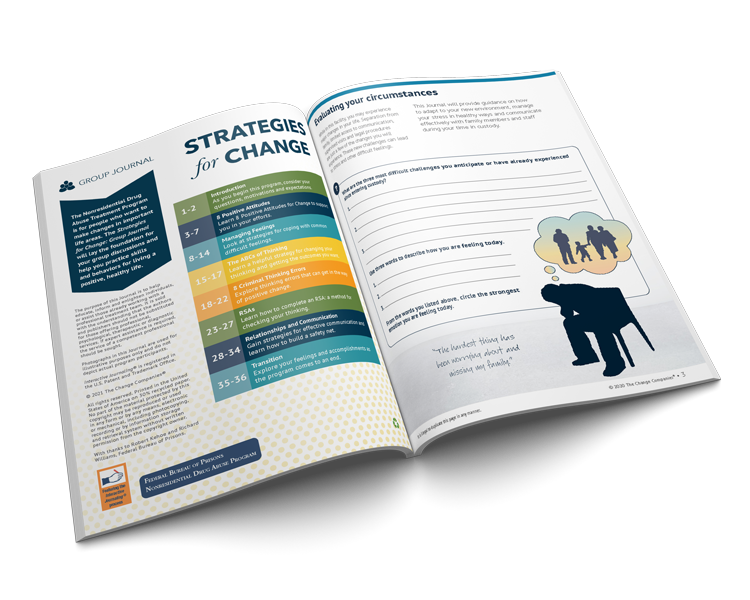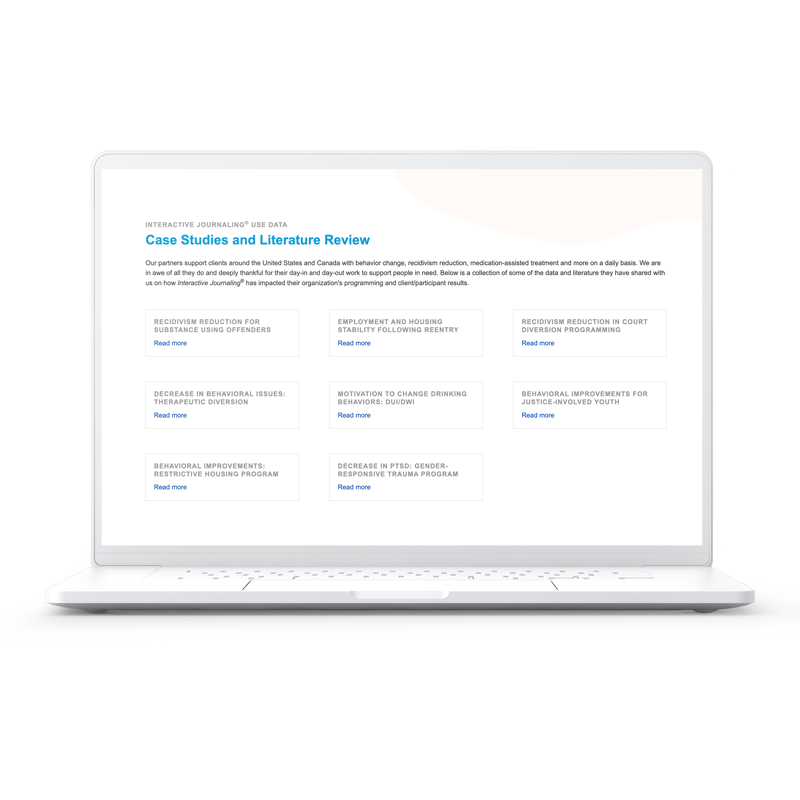
EVIDENCE-BASED SOLUTIONS
Jails
The evidence-based practice of Interactive Journaling® has been studied in jail settings and found to be an effective tool for recidivism reduction and recovery from substance use. It provides prosocial program opportunities to guide individuals toward positive behavior change.
At The Change Companies, we put the tools for change directly into the hands of clients and equip staff with tools for person-centered care in one convenient platform. Select from a variety of curricula built on the evidence-based practice of Interactive Journaling® to create your customized solution.
In addition to evidence-based curricula, our core solution includes access to the Fidelity Platform and live training for staff to ensure your organization is implementing best practices and gaining relevant skills for effective, person-centered treatment.
QUICK NAVIGATION
This page provides an end-to-end solution for jail professionals that includes curriculum, training and additional clinical resources.
| Risk-Need-Responsive Jail Interventions | |
| Staff Training and Skill Building | |
| Case Studies | |
| Digital Curriculum (Atlas) |
Solution Benefits
NO. 1
Brief interventions for shorter incarceration periods
NO. 4
Increase prosocial behavior
NO. 2
Compatible with most risk-need-responsivity models
NO. 5
Improved staff morale and retention
NO. 3
Reduce recidivism and decrease site safety incidents
NO. 6
Drive taxpayer ROI
“[Interactive Journaling®] helped me examine the differences between unhealthy and healthy relationships, how to communicate well with others. Also learn how irresponsible and criminal behaviors affected me, my friends and family members’ lives, and examine these feelings that caused me problems.” Interactive Journaling® participant
“The Journals are easy to understand and the women enjoy the step by step process…I am most proud when I see the light come on for each client, when they understand and are willing to change their lives one step at a time.” Michele Hamasaki, Substance Abuse Specialist, Hawaii Department of Public Safety
“Offenders are making better choices and understanding why they continue to come back to jail… Several offenders have not come back to jail, gotten a job and are living healthier, mentally and physically.” Amy Pierce, Clinical Coordinator, Western Virginia Regional Jail
EXPLORE CURRICULA
Risk-Need-Responsive Jail/Diversion Interventions
Browse curricula in our online store →
Below are our recommended curricula for jails and diversion programs. These curricula incorporate the evidence-based practice of Interactive Journaling® and help you create a person-centered program design
Substance use track
Strategies for Change is a cognitive-behavioral treatment program. It addresses substance use issues and provides skill building in the areas of criminal and rational thinking, healthy relationships, prosocial lifestyle and communication.
MOUD
The Medication Assisted Treatment Journal takes a whole-person approach to treatment and recovery, giving participants the opportunity to not only learn more about medication as a form of treatment, but to gain skills and insights that will help them make positive life changes, set healthy goals and live a full life in recovery.
Trauma programming for women
Trauma in Life emphasizes the experiences of women and their responses to trauma. Participants enhance their knowledge of trauma, assess the impact of trauma in their lives, develop strategies to increase resilience, break the cycle of trauma and consider next steps.
Trauma programming for men
Traumatic Stress and Resilience is a Journal written specifically for men who have experienced some form of trauma. Participants work through each section, identifying personal challenges, strengths and skills to promote recovery and build resilience. Topics include identifying characteristics and common symptoms of trauma and strategies to cope with traumatic events.
Brief cognitive-behavioral intervention
Basic Cognitive Skills outlines a way for participants to understand their harmful, self-defeating behaviors. They learn to apply the Five Rules for Rational Thinking and conduct a Rational Self-Analysis to check and challenge their thinking.
Transition from custody
Each section of the Transition Skills curriculum focuses on a different topic relevant to reentry. Participants work to develop key skills that help them make responsible choices and avoid future incarceration.
Financial Literacy
The Financial Literacy curriculum gives participants the opportunity to explore their money management skills and their beliefs about finances. Topics include checking, saving and investing, credit and loans, insurance, financial pitfalls, budgeting and thriving with money.
Job readiness
The Career Exploration curriculum allows participants to explore how their current strengths, skills and interests align with a career path. Participants develop a plan for pursuing their identified career path and learn strategies to experience success in applying for, getting and keeping a job.
Parenting
Strengthening My Parenting Skills helps participants explore what parenting means to them and the ways they plan to support their children now and in the future.
Orientation to detention
The Navigating the Road Ahead Journal provides strategies for adapting to a new environment, dealing with change, managing stress, communicating effectively and identifying solutions.
Change readiness
The Preparing for Change Journal features information and activities designed to help participants look closely at their current situation and consider changes they may want to make.
Victim impact
The Impact of Crime on Victims curriculum is designed to increase participants’ knowledge of the effects of crime, violence and victimization. Five categories of crime and the impact of those crimes on the victims are covered.
Domestic violence
The SAFE curriculum keeps participants focused on their change efforts. Participants engage with the core material through self-recognition and skill-development exercises that explore how past influences, high-risk beliefs and maladaptive thinking led to abusive behavior. Participants use this information to develop positive and prosocial skills, leaving the program with a personalized plan for stopping abusive behaviors.
ReThink Now
ReThink Now is a brief cognitive behavioral skill-building program designed to address misdemeanors and minor crimes. Suitable referrals for ReThink Now include possession, reckless or irresponsible driving, theft, assault, resisting arrest, family court issues or multiple offenses.
Diversion programs
The Anger Management curriculum gives participants an opportunity to explore the role anger plays in their lives and offers strategies and skills for managing how they experience and express anger and other difficult feelings. The curriculum incorporates both cognitive-behavioral and mindfulness techniques to help participants increase their ability to think about their thinking.
RNR case management curriculum
The Courage to Change is an evidence-based supervision/case management model that uses a cognitive-behavioral approach to help participants address individual problem areas based on a criminogenic risk and needs assessment.
Family Program
The Women's Family Program and Men's Family Program helps incarcerated people build, strengthen and maintain healthy family relationships.
UPSKILL STAFF and ENSURE IMPLEMENTATION FIDELITY
Staff Training and Skill Building
Download the training options guide →
Fidelity Platform
The Change Companies’ Fidelity Platform is an integrated resource center providing a wide range of learning opportunities and resources to enhance the skills and knowledge of jail and diversion professionals. On-demand trainings, a microlearning library and facilitator resources support continuous learning and improvement that are relevant to job roles and career development.
Live Training
The Change Companies’ two-day facilitator training helps jail and diversion professionals further develop their skills. Live training focuses on building helpful working relationships with clients, practicing motivational skills, preparing for sessions and using evidence-based case management techniques.
INTERACTIVE JOURNALING®
Case Studies and Research
A randomized controlled trial of Interactive Journaling® in a jail setting showed that for inmates arrested for an alcohol- or drug-related offense, recidivism rates were 15% lower for the Interactive Journaling® group 12 months after Journal dissemination.










